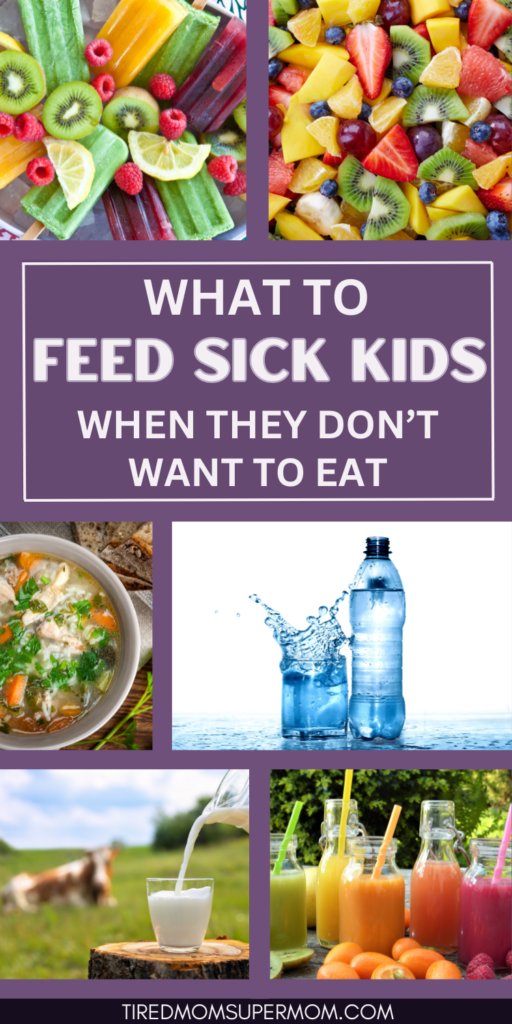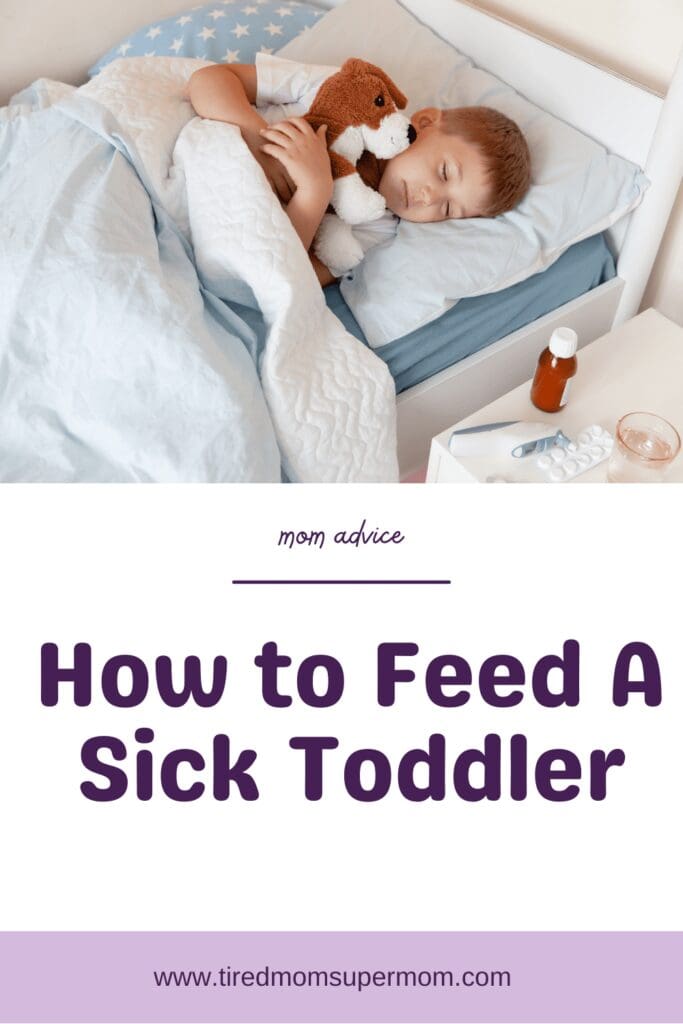What To Feed A Sick Toddler Who Won’t Eat
When your toddler is under the weather, getting them to eat can feel like a battle.
If your toddler is sick and refusing food, you’re not alone. It can be worrying when your little one has no appetite—especially if they’re already fussy on a good day. But knowing what to feed a sick toddler can make a big difference in helping them heal and stay hydrated.
In this guide, you’ll find gentle food ideas, hydration tips, and helpful products that can support your sick toddler through colds, flu, tummy bugs, or fevers.
This article is not intended to replace medical advice. Always contact your health care provider with questions or concerns regarding your child’s health.

Why Toddlers Refuse Food When They’re Sick
When your toddler is unwell, everything from a sore throat to nausea can suppress their appetite. Illness affects their sense of taste, causes fatigue, and can even make favorite foods unappealing. It’s not about being difficult—it’s their body’s natural way of conserving energy.
That’s why the key is to offer small, nutrient-dense, comforting foods they can handle—even if it’s just a few bites at a time.
What to Feed a Sick Toddler (Even When They Don’t Feel Like Eating)
Here are 35 practical food and drink ideas that can support your toddler through different types of illness:
1. Bananas
Easy to digest and full of potassium. Mash or slice them for toddlers with sore throats.
2. Applesauce
Unsweetened applesauce is gentle on the tummy and easy to swallow.
👉 Try this Organic Applesauce Pouch Pack (Amazon) – no mess and kid-approved.
3. White Rice
Plain rice is bland and easy to digest—perfect for upset stomachs.
4. Plain Pasta
Serve with a touch of olive oil or butter for easy calories without strong flavor.
5. Oatmeal
Warm and soothing. Add cinnamon or mashed banana for extra comfort.
6. Scrambled Eggs
Soft, mild in flavor, and packed with protein.
7. Yogurt with Live Cultures
Soothes sore throats and supports gut health.
👉 Stonyfield Organic Kids Yogurt is a parent favorite.
8. Chicken Broth
Sip it warm in a cup or serve with soft noodles or rice.
9. Fruit Smoothies
Blend banana, plain yogurt, and berries for a hydrating, vitamin-rich drink.
👉 Magic Bullet Blender makes quick work of toddler smoothies.
10. Saltine Crackers
Mild and comforting for toddlers with nausea or vomiting.
11. Popsicles
Great for hydration and sore throats.
👉 Make your own with reusable popsicle molds.
12. Pedialyte Freezer Pops
Electrolyte support and hydration in a fun format.
13. Mashed Potatoes
Comfort food that’s easy to swallow—bonus if they’re warm and buttery.
14. Toast or Plain Bread
Stick to white bread or lightly toasted slices.
15. Boiled Carrots
Soft, sweet, and easy to mash.
16. Steamed Apple Slices
Warm, soft apple slices for toddlers who can’t chew well.
17. Rice Cereal
Especially for younger toddlers—gentle and easy to digest.
18. Soft Scrambled Tofu
Great plant-based protein and neutral in flavor.

Hydration: The Most Important Part
I’ve had my fair share of sick days trying to guess what to feed a sick toddler who won’t touch toast but suddenly wants a smoothie.
When your toddler is sick, hydration is more important than food—especially if there’s vomiting or diarrhea involved.
Tips for keeping your sick toddler hydrated:
- Offer water in small sips every 15–20 minutes
- Try diluted apple juice (50/50 with water)
- Use a fun sippy cup or straw to make it more appealing
👉 These Munchkin Miracle 360 Cups are great for toddlers
If your toddler is very resistant to fluids or you notice signs of dehydration (dry lips, dark urine, no tears), seek medical advice.
What to Feed a Sick Toddler With Specific Symptoms
One of the biggest challenges for parents is figuring out what to feed a sick toddler who refuses even their favorite snacks.
🤒 If They Have a Fever
Focus on hydration and gentle foods like:
- Applesauce
- Yogurt
- Smoothies
- Brothy noodles
🤢 If They’re Vomiting
Avoid dairy. Start with:
- Clear liquids
- Ice chips
- Plain rice
- Dry toast or crackers
💩 If They Have Diarrhea
Stick to the BRAT diet:
- Bananas
- Rice
- Applesauce
- Toast
👉 Add a probiotic-rich yogurt or consult your doctor about toddler probiotics.
😷 If They Have a Cough or Sore Throat
Offer warm fluids like:
Popsicles for throat reliefm. In some cases, hospitalization may be necessary to treat severe dehydration.
- Chicken broth
- Oatmeal
- Scrambled eggs
Real-Life Mom Tips for Feeding Sick Toddlers
When you’re unsure what to feed a sick toddler, sticking to gentle, familiar foods can ease stress for both you and your child.
As a mom of three, I know how tough it is when your child is sick and won’t eat. Here’s what’s worked in our home:
- Skip mealtime stress. No toddler eats well when pressured.
- Offer food often, not big portions. Think of it like grazing.
- Let them eat in a cozy spot. Sometimes cuddling with a snack on the couch is more appealing than sitting at the table.
- Use a favorite bowl or spoon. Even a little novelty helps.
- Stay calm. Their appetite will bounce back.
You can also check out these uplifting quotes for sick kids if you need a little emotional boost during a hard sick day.
Products That Help When Feeding a Sick Toddler
Sometimes, it’s not just the food—it’s the tools and environment that make a difference.
🛒 Try these items (affiliate links, Amazon.com):
- Pedialyte Electrolyte Solution
- Thermometer for Kids
- Toddler Cutlery Set with Easy Grip
- Comfortable Booster Seat for Lounging Meals
- Refrigerated Pouches and On-the-Go Snacks
Helpful Related Resources
Need more toddler tips during tricky times? These posts might help:
- Potty Training Travel Tips for Toddlers
- Quick Fixes for Toddler Stalling at Bedtime
- How to Keep Your Toddler from Bolting Out of the Stroller
📥 Grab the Free Printable: 35 Nourishing Ideas for Sick Toddlers
Feeling overwhelmed when your toddler won’t eat? Download this calming purple checklist and keep it on your fridge for sick days. Quick, simple, and mom-approved.
Frequently Asked Questions
Bookmark this post so you’ll always have ideas on what to feed a sick toddler during flu season or after a sleepless night with a fever.
How long can a sick toddler go without eating?
Most toddlers can go 1–2 days with very little food as long as they are drinking fluids. Prioritize hydration and consult your pediatrician if refusal continues longer.
Is it okay to give milk when my toddler is sick?
Milk is okay if they don’t have vomiting or diarrhea. For tummy bugs, skip dairy temporarily and opt for broths or water.
What if my toddler only wants snacks or sweets?
Offer nutrient-rich options in snack form—like bananas, toast with peanut butter, or yogurt. Avoid high-sugar treats, which can irritate the stomach.
Can I give them supplements when they’re sick?
Unless advised by your pediatrician, stick to fluids and food. But probiotics like this (Healthline) may help with gut recovery after stomach flu.
Should I wake my toddler to eat or drink?
Don’t wake them to eat. But if they’ve been sleeping a long time and haven’t had fluids, gently wake for a few sips of water or Pedialyte.
Final Thoughts: What to Feed a Sick Toddler Without the Stress
Every toddler responds to illness differently, but with patience and a few simple strategies, you can keep them nourished and on the path to recovery. Knowing what to feed a sick toddler means keeping it simple, soothing, and stress-free—for both of you.
And remember: This too shall pass. Before you know it, they’ll be back to asking for snacks every 5 minutes.
📌 Save This for Later on Pinterest!
Don’t forget to pin this post so you’re ready when your toddler catches their next bug. This list could save you a lot of stress.

